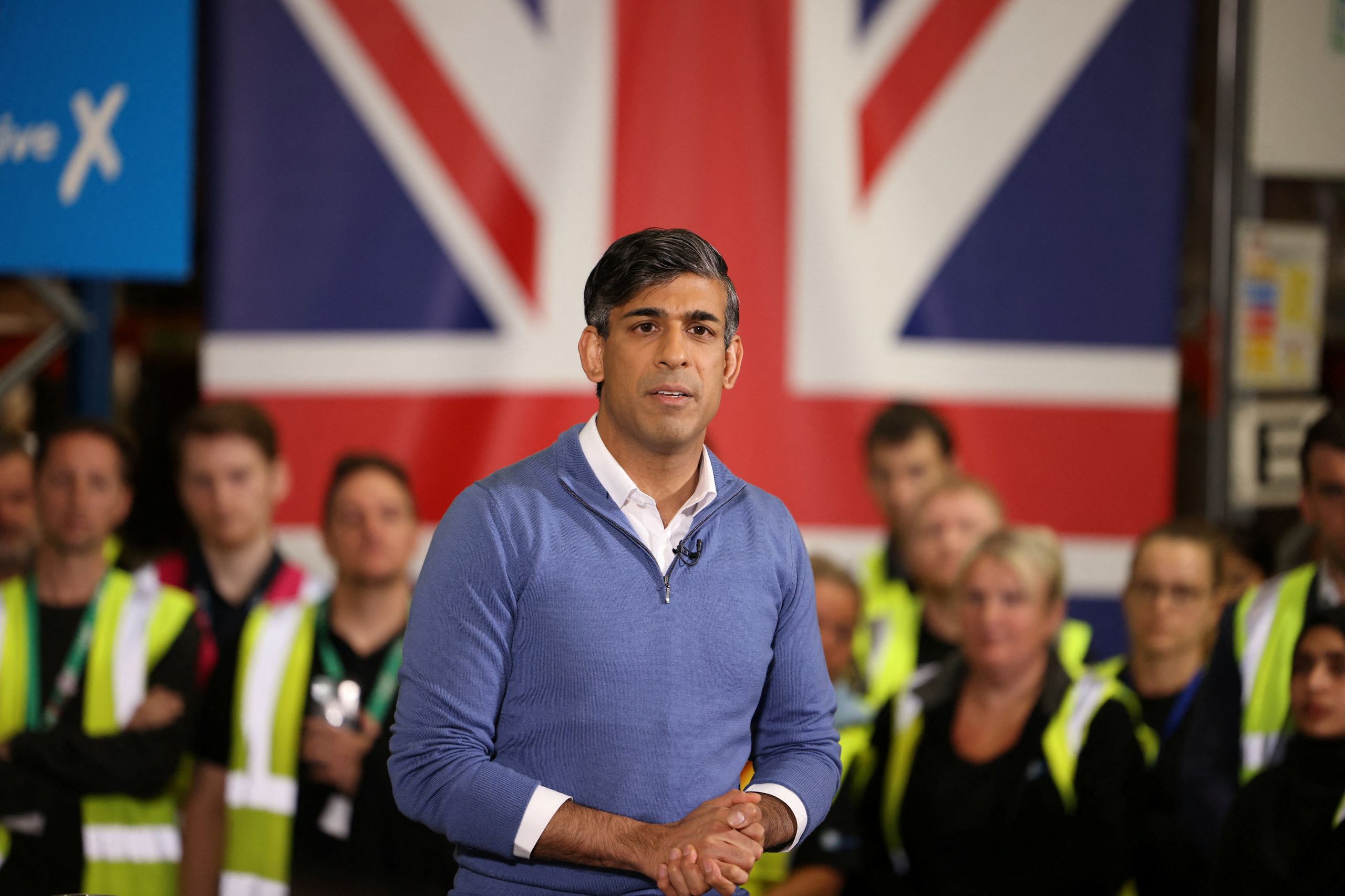LONDON—By Friday, British Prime Minister Rishi Sunak will almost certainly be drummed out of Downing Street, with his ruling Conservative Party facing its deepest hole in more than a century.
Polls ahead of Thursday’s U.K. election show the opposition Labour Party and its leader Keir Starmer on course to win by a margin of about 20 percentage points, ending 14 years of government by the ruling Tories. The question is: What will be the scale of the defeat for the world’s oldest and most successful political party, measured by years in power over the past 150 years?
If polls are right, the Conservatives are on course to get only about 20% of the popular vote—their lowest share in modern British history and less than half the 43.5% of the vote they racked up in the last general election, in 2019 , when the party won a huge parliamentary majority with 365 seats compared with just 203 for Labour.
According to a Survation poll Tuesday, the Tories are on course to slump to just 64 seats in Parliament, leaving them at risk of being usurped by the Liberal Democrats as Britain’s main opposition party.
For the Tories, the looming defeat caps more than a decade in power that has seen five prime ministers and dramatic moments such as Britain’s vote in 2016 to leave the European Union . Ever since, the British economy has struggled , hurt further by the pandemic and the war in Ukraine. And the party has often been riven by conflict and buffeted by scandal. Party lawmakers are now bracing for at best five years in opposition and at worst internal divisions that could tear it apart.
Sunak, a former Goldman Sachs banker, has spent the last few days of the campaign urging voters to elect enough Tories that Labour will have a real opposition and not “a blank check.”
Even as the Tories limped toward the end of their parliamentary term, they ran a campaign widely seen as strewn with mistakes.
In May, Sunak surprised almost everyone by calling an early election for this summer, despite being far behind in the polls. As he made the announcement outside 10 Downing St., a rainstorm broke and the prime minister, with no umbrella, continued to make his campaign pitch even as he got drenched.
Two days after calling the election, Sunak held an event in Northern Ireland at a dock near where the Titanic was built. “Are you captaining a sinking ship going into this election?” a reporter asked. Despite promising a range of tax cuts and a hard-line immigration policy, the polls aren’t moving.
Sunak “is traveling around the country getting whacked,” said Andrew Cooper, a Conservative member of the House of Lords and a pollster. “If this was a boxing match, they’d have called it off by now.”
Sunak and other senior Tories have defended the campaign and said the result is “not a foregone conclusion.”

British Prime Minister Rishi Sunak visits the Morrisons supermarket as part of a Conservative general election campaign event, in Carterton, Britain July 2, 2024. REUTERS/Phil Noble/Pool
An Ipsos poll last week found that the 44-year-old Sunak had the highest disapproval rating of any prime minister attempting to be re-elected in 50 years, with 75% of voters thinking he isn’t doing a good job. Oddsmakers give Sunak, once hailed as the rising star of the Conservatives, a less than 0.7% chance of staying on as prime minister. Many of his lawmakers are despondent.
One reason the Tories are heading to such a bruising defeat is simply that voters are ready for a change. No British political party has ever won a fifth successive term in office. British politics tends to work in cycles, with the two main parties usually getting a run of between 10 to 15 years before the public votes in the opposition. The Tories ruled from 1980 to 1997, Labour from 1997 to 2010, and the Tories since then.
But the Tories are also being undone by their own economic record, part of it because of bad luck and part of it of their own making.
In the past five years, real wages have fallen off the back of a triple whammy of Brexit , the pandemic and the war in Ukraine, which caused energy prices and inflation to skyrocket. Since the last election, real household income has fallen—the first time since records began in 1955 that British households are, when adjusted for inflation, on average poorer after a parliamentary term, according to the Resolution Foundation, a London think tank.
To shield the economy from the twin shocks of the pandemic and the war, government spending and taxes shot up, and Britain’s tax take is at its highest levels since the 1940s. Immigration has surged to record levels. There are 7.5 million people waiting for treatment at the state-funded National Health Service. Inflation has come down from 11% to 2%, but interest rates have yet to be meaningfully cut.
The tax rise and record levels of immigration have led to the return on Britain’s political scene of Nigel Farage, a populist who pushed for Brexit and who is now back with a new party called Reform UK. Polls show Reform claiming about 15% of the vote, draining support from the Conservatives. Farage has said he wants to take over the Tories after the election.
“It’s obviously been extremely difficult,” says Steve Baker , a Conservative lawmaker. Some lawmakers fret a much-shriveled Tory party could dissolve after the election, or submit to Farage.
The collapse in Conservative support is a brutal denouement to a political arc that started in 2010, when the Tories came back into power amid the fallout from the 2007-08 financial crisis. The Conservatives chose to patch up the nation’s finances by drastically cutting public spending rather than raising taxes or borrowing more. After a few years, the cuts caused a deterioration in public services like the state-run health service .
The Conservatives then gambled on the future of the British union by holding a referendum on Scottish independence, which the people of Scotland rejected. That was followed by a bet on Britain’s membership in the European Union. The Conservative Party’s leadership campaigned to stay in the EU. The nation voted to leave. The Tory party successfully repositioned itself under Boris Johnson as the party of Brexit and big state intervention to help build up those areas of the country that felt left behind by globalization.
But Johnson was ousted after successive scandals, including being caught at parties during Covid-19 lockdowns. Voters’ trust was further eroded after his successor Liz Truss caused a market selloff with the promise of a series of unfunded tax cuts. She lasted only a few weeks , and Sunak—the third British prime minister in less than a year—was brought on to limit the damage.

Former British Prime Minister Boris Johnson was ousted after successive scandals.
REUTERS/Hollie Adams
Sunak stabilized the economy in part by raising taxes and cutting spending to steady the pound. But the economy has failed to grow. Sunak “began in a bad position and it has gotten worse,” says Philip Cowley, a politics professor at Queen Mary University of London.
Sunak called a snap election in the hope Labour’s policies would fall apart under scrutiny. An early election call also hoped to catch the Reform UK party off guard. But Farage quickly joined the race, ramming home the message that the Tories weren’t serious about curbing immigration.
Sunak then handed Farage an electoral gift by leaving an event in France to mark the 80th anniversary of D-Day early to attend a television interview. Farage said the move was unpatriotic. Sunak apologized. But the damage was done.
A betting scandal then erupted. Up to 15 Conservative candidates and officials are being investigated over alleged bets on the timing of the general election.
Sunak, who is the richest person in Parliament, thanks partly to his marriage to the daughter of an Indian billionaire, has at times struggled to connect with the British public.
On a talk show last week, a woman asked him, “How can a prime minister who is richer than the king relate to any of our needs and struggles?” Sunak replied, “Sophie, when it comes to food banks, I am always incredibly grateful to those who support them.”
Write to Max Colchester at Max.Colchester@wsj.com and David Luhnow at david.luhnow@wsj.com



